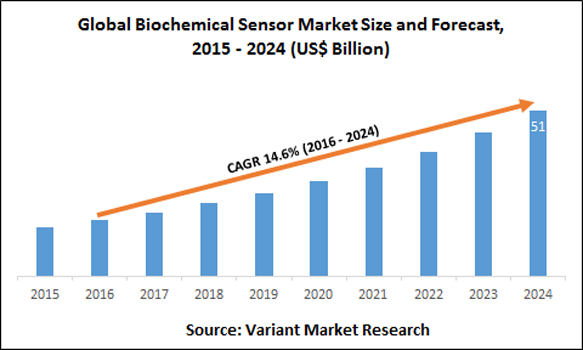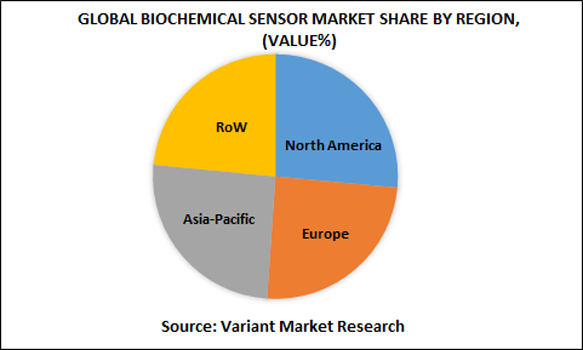Biochemical Sensor Market Overview :
Global Biochemical Sensor Market is estimated to reach $51 billion by 2024; growing at a CAGR of 14.6% from 2016 to 2024. Biochemical sensor is a kind of sensor that is used to convert any biological or chemical sample into analytical or electrical signal with the help of transducers. These sensors are extensively utilized in medical diagnosis, environmental monitoring, examining food quality and defense & safety. Rise in health awareness has increased government initiatives for ensuring food safety which show increased biochemical sensor market trends.

Increased health awareness, advancement in material chemistry and wireless sensor network, rise in oil extraction, and rising incidents of motor vehicle accidents are the major factors driving the global biochemical sensor market. However, limited commercialization due to complex product design and incompatibility in real world application would restrain the market growth in coming years. Increasing application of wearable biochemical sensors in defense and bio surveillance would provide several growth opportunities for the market in coming years.
The global biochemical sensor market has been segmented on the basis of product, film deposition material, application. By product, the market is segmented into piezoelectric sensor, thermal sensor, gas sensor, optical sensor, and electrochemical sensor. The electrochemical sensor segment accounted for the largest market share in 2016, owing to its high sensitivity and huge demand in chemical diagnosis.
By film deposition material, the market is further divided into fluorine doped tin oxide (SnO2:F), titanium oxide (Tio2), aluminium oxide (AL2O3) and silicon oxide (SiO2). The silicon oxide (SiO2) segment accounted for the largest market share in the overall film deposition material segment in 2016, due to its small size and extensive utilization in clinical diagnosis devices and environmental monitoring devices.
By application, the market is bifurcated into environmental monitoring, clinical diagnostics, military, food quality control and others. The clinical diagnostics segment dominated the application segment accounting for more than one-third of the total market share in 2016, driven by its extensive usage during pregnancy test and diagnosis of glucose level in blood sample.

Based on geography, the global biochemical sensor market has been segmented into North America (U.S., Mexico and Canada), Europe (Germany, UK, France, Russia, Italy, and others), Asia-Pacific (China, India, Japan, and others) and RoW (South America, Middle East and Africa).
Major companies operating in the biochemical sensor market are Texas Instrument Inc., Thermo Fisher Scientific., GE Healthcare, Bio-Rad Laboratories Inc., Microchip Technology Inc., Polestar Technologies Inc., Melexis, Universal Biosensor Inc., Honeywell International Inc. and Nova Biomedical Corporation, among others.
The key takeaways from the report
- The report will provide detailed analysis of the Global Biochemical Sensor Market with respect to major segments such as product, film deposition material, and application
- The report will include the qualitative and quantitative analysis with market estimation over 2015-2024 and compound annual growth rate (CAGR) between 2016 and 2024
- Comprehensive analysis of market dynamics including factors and opportunities of the Global Biochemical Sensor Market
- An exhaustive regional analysis of Biochemical Sensor Market from 2015 to 2024 has been included in the report
- Profile of the key players in the Biochemical Sensor Market, will be provided, which include key financials, product & services, new developments and business strategies
Scope of Biochemical Sensor Market
Product Segments
- Piezoelectric Sensor
- Thermal Sensor
- Gas Sensor
- Optical Sensor
- Electrochemical Sensor
Film Deposition Material Segments
- Aluminium Oxide (AL2O3)
- Titanium Oxide (Tio2)
- Fluorine Doped Tin Oxide (SnO2:F)
- Silicon Oxide (SiO2)
Application Segments
- Environmental Monitoring
- Clinical Diagnostics
- Military
- Food Quality Control
- Others
Geographical Segments
- North America
- US
- Canada
- Mexico
- Europe
- Germany
- France
- United Kingdom
- Spain
- Others
- Asia-Pacific
- China
- India
- Japan
- South Korea
- Others
- RoW
- South America
- Middle East
- Africa



